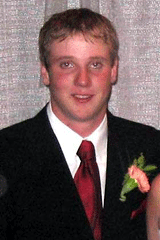
Linda Bush said she learned a disturbing lesson in the weeks and months following her son Ian's death at the barrel of an RCMP officer's gun in 2005: justice is not always served when the police investigate their own.
The message was echoed by lawyers, civil rights advocates and even the former chair of the commission that handles public complaints against the RCMP, at a forum on deaths in police custody yesterday.
They argued that B.C.'s current system, which allows internal investigations of death or serious injury at the hands of police, is one that breeds secrecy and corruption.
Until federal and provincial governments create an independent body to review deaths-in-custody, they say, the number of victims like Ian Bush will continue to grow -- as will public mistrust of law enforcement.
Following the 'script'
For Bush and family members of two other men shot and killed by police in the past two years, the mistrust began with the media releases that were issued immediately after their loved ones died.
"These claims are made immediately," said Bush, who remembers Ian being described as a "person known to police" who had "become very violent."
"It seemed pretty clear to us that conclusions had already been drawn."
"The script is written and everyone follows it," said Dolores Young, whose son, Kevin St. Arnaud, was shot by an RCMP officer in Vanderhoof in 2004.
"The script doesn't call for charges being laid, it doesn't call for culpability or accountability."
Ian Bush, Kevin St. Arnaud and Gerald Chenery, who was shot and killed by Vancouver police in 2004 and whose sister, Sylvia Fee, also attended the forum, account for a small percentage of men killed in B.C. by police in the past several years.
Robert Holmes, vice-president of the B.C. Civil Liberties Association, which organized the forum, said there were 11 deaths in police custody or pursuit in 2004. The following year, that number was 13. Last month alone, the association filed four death-in-custody complaints against the RCMP and Vancouver police department.
"We believe that in order to inspire public confidence, there needs to be as much civilian review as possible," he said.
"The system of police accountability needs to be changed."
'Fox in charge of chicken coop'
Currently, when a person dies in police custody or while being pursued by police, a team of investigators -- made up of officers from the same force or a different one -- come in to try and determine what happened. They provide the evidence used in a criminal investigation and coroner's inquest.
The Commission for Public Complaints against the RCMP is mandated to conduct reviews when complainants are not satisfied with RCMP handling of a complaint, but even it has no teeth, says the past chair of the commission, Shirley Heafey.
"I was told, contrary to my understanding and common sense, the fox was to be in charge of the chicken coop, and I would have to rely on the benevolence of the fox."
That's because the commission can't subpoena evidence or question witnesses involved in an RCMP investigation. It only has access to investigation material if the RCMP commissioner willingly hands it over.
It is possible to bring RCMP evidence into the public, said Heafey, if the chair of the complaints commission decides to hold a hearing.
"The hearing is an administrative tribunal, it's quasi-judicial," she said, adding that in the cases of Ian Bush and Kevin St. Arnaud, current chair Paul Kennedy "should be doing this," but isn't.
Police 'immune': Cameron Ward
Even if the RCMP did hand over all their information immediately, there would still be bias, real or perceived, in the way they and other police conduct investigations, said the Bush family lawyer, Howard Rubin.
He noted that after Ian Bush was killed, paramedics were kept waiting for 30 minutes outside the detachment. The officer who pulled the trigger, Const. Paul Koester, didn't produce a final statement until months later and even then the questions were pre-approved by his lawyer. The RCMP refused to allow a re-enactment of the incident, which, according to one blood-splatter expert, was impossible to have happened the way Const. Koester described it.
Despite this, there were no criminal charges laid, no blame assigned. Young's lawyer, Cameron Ward, said police are "immune from prosecution."
David Eby, who represents Fee, said he believes investigators provide officers with the answers they're looking for, instead of the truth.
In Chenery's case, he says the investigation was "half-hearted at best," and described many of the same flaws Rubin found in the Bush case; delayed interviews, missed evidence and a failure to re-create the scene.
"They didn't want to find these officers had done anything wrong," he stated.
Police told to change weapons
At a coroner's inquest, the goal is to find facts, not lay blame, but the civilian jury is allowed to make recommendations. However, police don't have to follow or even respond to those recommendations.
One recommendation that came of Chenery's inquest was the mandatory use of less fatal weapons before discharging a gun -- but nothing has come of it so far.
According to police, an officer is always right to shoot if they feel their life is in danger -- and the claim of self-defense has never been disproved despite any evidence to the contrary.
"It is incomprehensible that here in B.C. we have this wild-west mentality," said Ward. "There is a veneer of objectivity but it's not real."
Call for Special Investigations Unit
To maintain objectivity during an investigation, it's necessary to have an independent team on the scene right away, he says. He and others want a system of oversight in B.C. similar to the one in Ontario.
There, a special investigations unit of the province's Ministry of the Attorney General is on the scene immediately after a person dies or is seriously injured in police custody. It is independent from any one police service, although largely made up of former cops.
"The SIU owns the scene," said Andre Marin, Ontario's ombudsman and former director of the special investigations unit.
He said he believed change will come to this province; it's just a question of when.
"Hopefully sooner rather than later," he said. "Public policy today is that government's rule by crisis, unfortunately."
Which leaves Bush, Young, Fee and the families of other people who have died at the hands of police wondering when enough is enough?
"Until there is due process, police will not change their ways," she said. "Only with accountability will solutions be found and it may well start with training and recruitment."
Young and Fee also said they think there should be systematic changes with regard to how officers are trained to deal with the public.
"The law is supposed to be there to protect us but so many people are dying like this," said Fee. "Your brother, son, cousin, best friend could end up in the wrong place at the wrong time."
Related Tyee stories:
- Dead in Custody
TYEE SPECIAL REPORT: Did Vancouver police fail to save Roman Andreichikov's life? Or did they have a hand in killing him? The mystery may centre on a factor called 'excited delirium'. - Pain and Doubt Persist in Houston
Family suing to learn evidence used to clear officer in son's death. - Bush Inquest Grips Houston
B.C. man was shot dead in RCMP custody.
















Tyee Commenting Guidelines
Comments that violate guidelines risk being deleted, and violations may result in a temporary or permanent user ban. Maintain the spirit of good conversation to stay in the discussion.
*Please note The Tyee is not a forum for spreading misinformation about COVID-19, denying its existence or minimizing its risk to public health.
Do:
Do not: